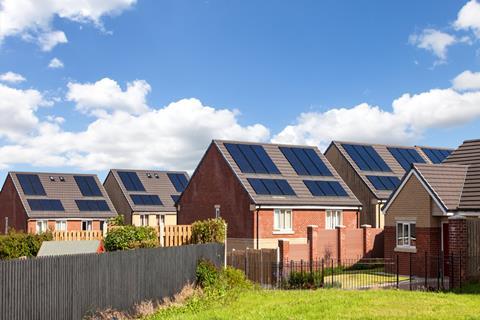Housebuilders worried that glitch in Future Homes Standard software will mar roll-out of energy efficiency standard
Housebuilders have hit out at the government after software failures meant firms couldn’t properly respond to a consultation on the Future Homes Standard, forcing officials to issue an emergency fix and prompting a last-minute delay.
The Department for Levelling Up, Housing and Communities (DLUHC) this week said that consultations on the Future Homes and Buildings Standards and new Home Energy Model (HEM) designed to underpin it had been extended from the original closing date of March 6 to March 27.
In a “clarification note” published by the department, it said the delay was because it was “aware of certain aspects of these consultations which are causing confusion or concern”. A separate explanation, contained in the consultation page itself makes clear the delay is due to “an issue with the consultation version Home Energy Model software that informs responses to the Future Homes and Buildings Standards consultation”.

The Future Homes Standard (FHS) is being brought in to ensure all new build homes are “zero carbon ready” from 2025.
HEM is new software which has been designed to replace the longstanding SAP software used to calculate the designed energy performance of a building based on a range of assumptions – and is to be used to calculate a building’s performance against the FHS.
>> See also What the Future Homes Standard means for net zero
>> See also Government must provide more clarity on the Future Homes Standard
Housing Today understands the problem with the version of HEM consulted on, which related to how heat pumps were accounted for in the software, meant it was impossible to demonstrate compliance with the FHS using buildable specifications from a range of house types – including homes with Solar PV on the roof and a heat pump, but where the PV panels weren’t south-facing.
The explanation on the consultation page says: “We have recently been made aware of an issue with the consultation version Home Energy Model software, which was affecting the modelled solar PV yield if solar panels were not facing south”. While the explanation says the department has issued a fix for the problem, housebuilders are understood to be concerned that the problems with the software are more wide-ranging.
A more detailed explanation of the issues facing housebuilders responding to the consultation, provided by the Future Homes Hub, makes clear that the software model appears to be frequently requiring “significantly more area of PV”, leaving them with insufficient roof space to accommodate it, and that the heat pumps included in the model did not have the ability to modulate their output.
The department is now calling for respondents to its consultations to resubmit their responses, where necessary, by the new deadline.
One industry source said there was now concern that the longer term fix to the HEM software model could take anything up to two years, giving the potential to delay implementation of the Future Homes Standard.
Steve Turner, executive director at the Home Builders Federation, said the industry remained committed to implementing the Future Homes Standard, but that the government had to play its part by providing “the necessary guidance and modelling tools”.
He said: “The new standards require fundamental changes to how we deliver new homes and the industry urgently needs certainty to be able to plan ahead. The confusion and difficulties being experienced with the new Home Energy Model are frustrating and we hope that the extension to the consultation has allowed Government to make the necessary changes and prevent any further delays.”










No comments yet